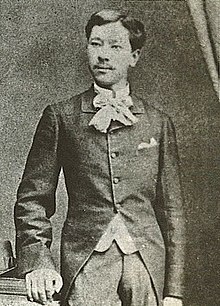Pedro Paterno
|
Excelentísimo Señor Pedro Alejandro Paterno |
|
|---|---|
 |
|
| 2nd Prime Minister of the Philippines | |
|
In office May 7, 1899 – November 13, 1899 |
|
| President | Emilio Aguinaldo |
| Deputy | Trinidad Pardo de Tavera |
| Preceded by | Apolinario Mabini |
| Succeeded by |
Jorge B. Vargas (Ministries involved) Position abolished (Position next held by Ferdinand Marcos) |
| Member of the Philippine Assembly from Laguna's First District | |
|
In office October 16, 1907 – May 20, 1909 |
|
| Preceded by | Position established |
| Succeeded by | Potenciano Malvar |
| Personal details | |
| Born |
Pedro Alejandro Paterno y de Vera Ignacio February 17, 1857 Manila, Captaincy General of the Philippines |
| Died | April 26, 1911 (aged 54) Manila, Philippine Islands |
| Alma mater | Ateneo de Manila University |
| Profession |
Poet Novelist |
Pedro Alejandro Paterno y de Vera Ignacio, also spelled Pedro Alejandro Paterno y Debera Ignacio (born on February 17, 1857 - died on April 26, 1911; in some references the birth date is February 27, 1858 while the death date is March 11, 1911) was a Filipino politician who has been called "the greatest turncoat in Philippine history." He was also a poet and novelist.'
His intervention on behalf of the Spanish led to the signing of the Pact of Biak-na-Bato on December 14, 1897, an account of which he published in 1910. Among his other works include the first novel written by a native Filipino, Ninay (1885), and the first Filipino collection of poems in Spanish, Sampaguitas y otras poesías varias ("Jasmines and Other Various Poems"), published in Madrid in 1880.
Pedro Paterno was born on the 17th of February, 1857. He was one of 13 children born to Don Máximo Paterno and his wife, Doña Carmen de Vera Ignacio. Máximo was exiled to Guam (then also part of the Spanish East Indies) for ten years following the 1872 Cavite mutiny, and died on 26 July 1900, leaving behind considerable wealth.
Pedro finished Bachiller en Artes at Ateneo de Manila and gained fame with his conclusion. At the age of 14, he was sent to study in Spain, where he spent the next 11 years at the University of Salamanca and then the Central University of Madrid (now the Complutense University of Madrid). At Salamanca he took courses in Philosophy and Theology, while at Madrid he graduated with an expertise in law in 1880. In 1893, he was awarded the Order of Isabella the Catholic.
At the trial of José Rizal in 1896, it was suggested that Paterno, along with Rizal, had incited the Katipunan because they had both written about the pre-Spanish Philippine History. As evidence for their complicity, the Spanish prosecution cited Paterno's earlier work Antigua Civilización as promoting ideas which had "consequences both erroneous and injurious to Spanish sovereignty." Nobody moved against Paterno, however, because he was close to a significant number of Spanish officials - both military and civilian - who could vouch for him. Thus, Paterno, like many others of the Manila elite, distanced himself from the events of the Katipunan revolution.
...
Wikipedia
